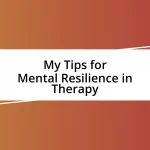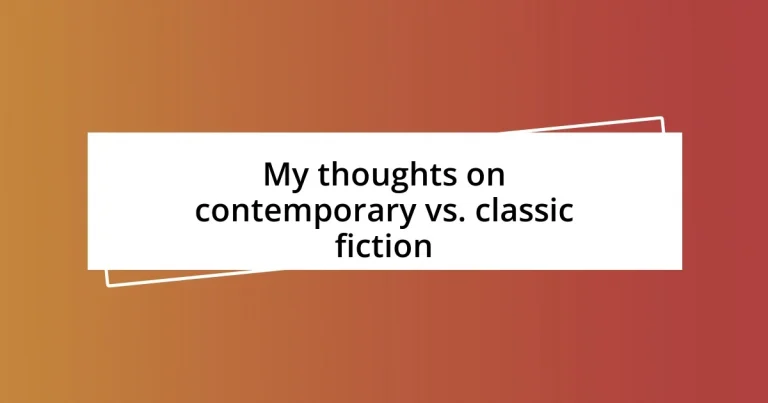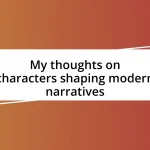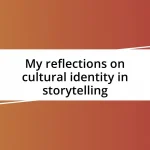Key takeaways:
- Classic fiction explores timeless themes of morality, love, and societal norms, prompting readers to reflect on their own values, as seen in works like “Pride and Prejudice” and “To Kill a Mockingbird.”
- Contemporary fiction addresses urgent social issues, identity, and mental health through diverse narratives, engaging readers in current conversations about representation and personal experiences, exemplified by titles like “The Hate U Give” and “Homegoing.”
- Key distinctions between the genres highlight classic fiction’s traditional narrative style and universal themes versus contemporary fiction’s innovative storytelling techniques and emphasis on immediate societal challenges.
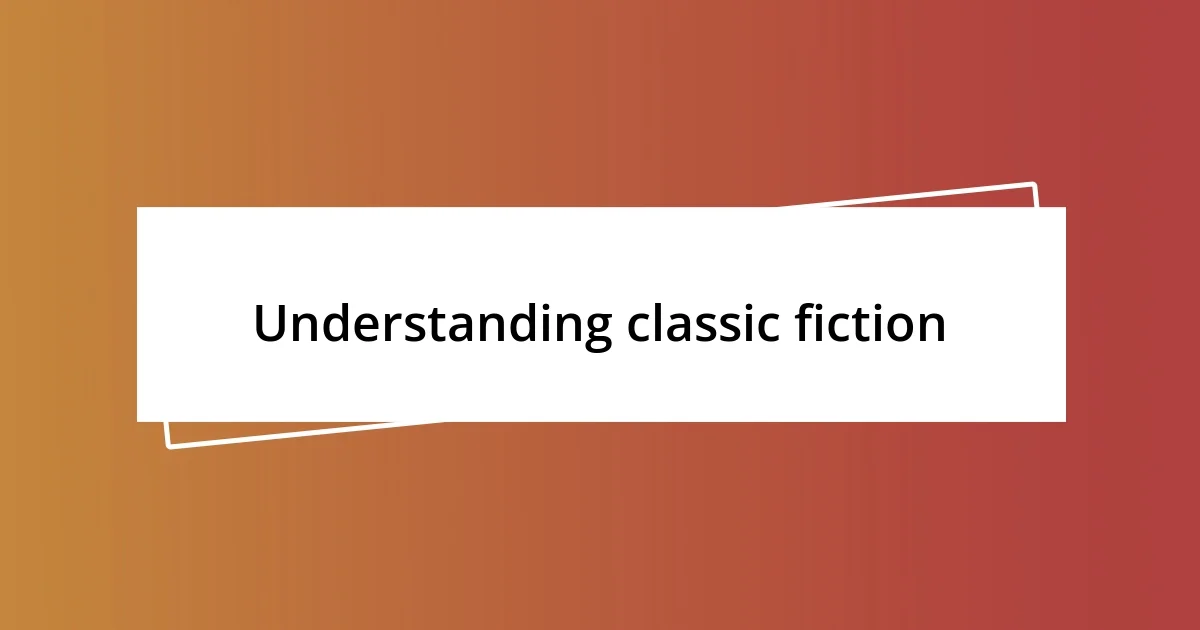
Understanding classic fiction
Classic fiction is more than just old books gathering dust on a shelf; it’s a treasure trove of timeless themes and complex characters that resonate with us even today. I often find myself reflecting on how reading novels like “Pride and Prejudice” or “Moby Dick” isn’t just about the plot but about the profound insights into human nature that these writers captured. Isn’t it interesting how these stories challenge social norms and delve into issues of morality, love, and identity, which are just as relevant now as they were when they were written?
When I first read “To Kill a Mockingbird,” I was struck by how Harper Lee’s exploration of racial injustice still stings with relevance. The emotions it evoked were palpable, almost raw, and I couldn’t shake off the feeling that I was part of a larger conversation about empathy and justice. Isn’t that the magic of classic fiction? It transcends time, inviting us to engage with societal issues and reflect on our own beliefs and values.
I can’t help but marvel at how classic fiction often serves as a mirror to our own lives. Take “1984,” for example; I remember finishing it and feeling a chill because it made me question the boundaries of truth and freedom in today’s society. Isn’t that the power of these narratives? They compel us to think critically about our world, drawing connections between past and present in ways that ignite our imagination and provoke deep introspection.
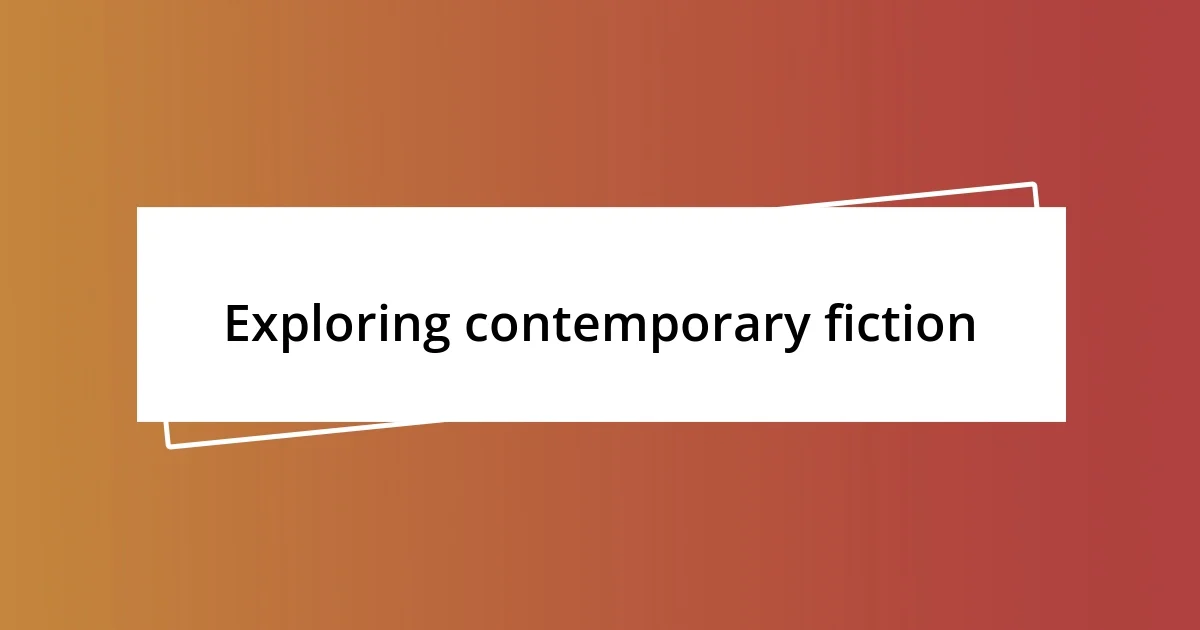
Exploring contemporary fiction
Exploring contemporary fiction reveals a vibrant landscape, filled with diverse voices and innovative storytelling techniques. I recently dived into the world of contemporary novels like “The Night Circus” by Erin Morgenstern, which captivated me with its enchantment and whimsical narrative structure. It feels refreshing to explore plots that intertwine magic with emotional depth, highlighting how contemporary authors push the boundaries of what a story can be.
In my experience, contemporary fiction often challenges traditional narratives by embracing themes like identity, mental health, and social justice. After reading “The Hate U Give” by Angie Thomas, I found myself reflecting on the importance of representation in literature. The heartfelt connection I forged with the characters made the story resonate deeply, pushing me to think critically about social issues that many face today. Isn’t it fascinating how such novels can spark conversations and bring about awareness in ways that classic literature sometimes struggles to?
Contemporary authors are reshaping storytelling in ways that feel both personal and universal. I remember sitting down with “Homegoing” by Yaa Gyasi and feeling an intense emotional connection as the generations of characters unfolded their stories. It’s astounding how today’s fiction can simultaneously touch upon historical trauma and contemporary struggles, making the reader feel intimately connected to the broader human experience.
| Aspect | Classic Fiction | Contemporary Fiction |
|---|---|---|
| Themes | Timeless, often focused on morality and society | Diverse, exploring identity and social issues |
| Narrative Style | Traditional, often linear | Innovative, sometimes non-linear or experimental |
| Character Development | Complex, often introspective | Diverse and relatable, often reflecting modern conflicts |
| Emotional Engagement | Profound, often reflective | Immediate, often urgent and relatable |
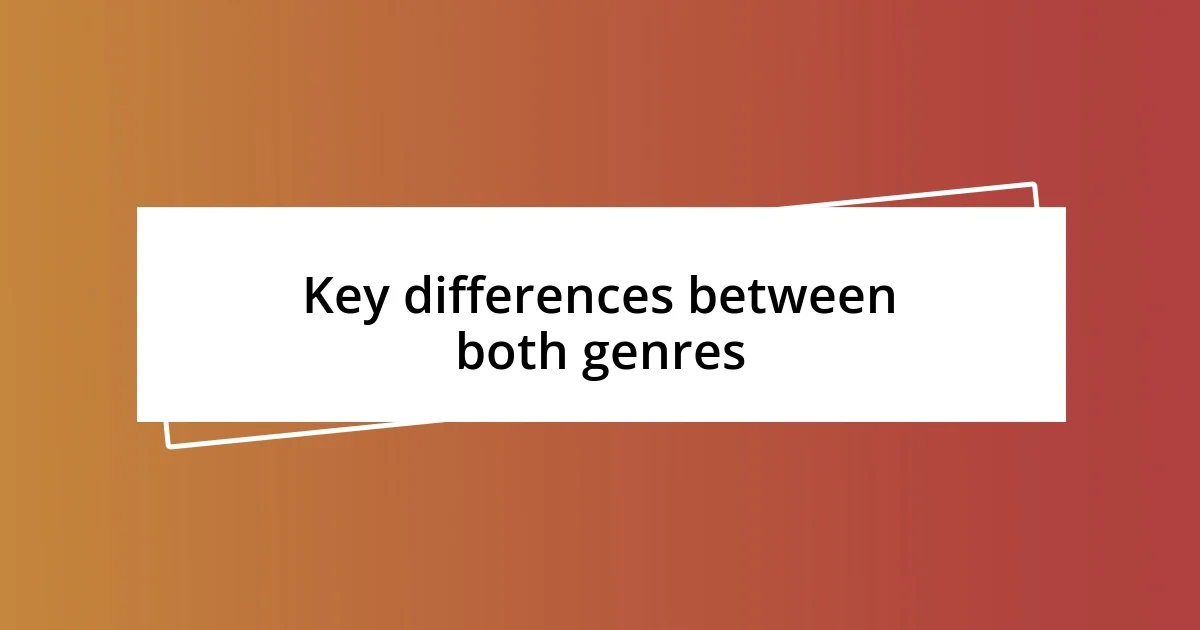
Key differences between both genres
One standout difference I notice is in how the themes are presented. Classic fiction tends to revolve around universal themes that explore morality, existence, and societal structures. I remember my first encounter with “Crime and Punishment.” The moral dilemmas faced by Raskolnikov lingered in my thoughts for days, urging me to reflect on my own values. In contrast, contemporary fiction often dives into personal and immediate issues, like mental health and identity. Reading “Eleanor Oliphant Is Completely Fine” left me feeling raw and exposed, as it tackled loneliness and the hurdles of modern society, making me ponder the emotional connections we often take for granted.
- Themes:
- Classic: Timeless narratives on morality and society.
- Contemporary: Diverse explorations of identity and urgent social issues.
In terms of narrative style, classic fiction usually adheres to traditional, linear storytelling. I find this structure comforting and familiar; it invites me into a well-worn world. However, contemporary authors often challenge these conventions. For example, when I read “One Hundred Years of Solitude,” the fluidity of time and a tapestry of supernatural elements began to reshape my perspective on narrative. It was like being swept into a whirlwind of creativity! Contemporary works frequently experiment with non-linear and fragmented storytelling, reflecting the chaos of our modern lives and offering a fresh twist that can be so invigorating.
- Narrative Structure:
- Classic: Linear and traditional.
- Contemporary: Innovative and sometimes non-linear, mimicking the complexity of modern life.
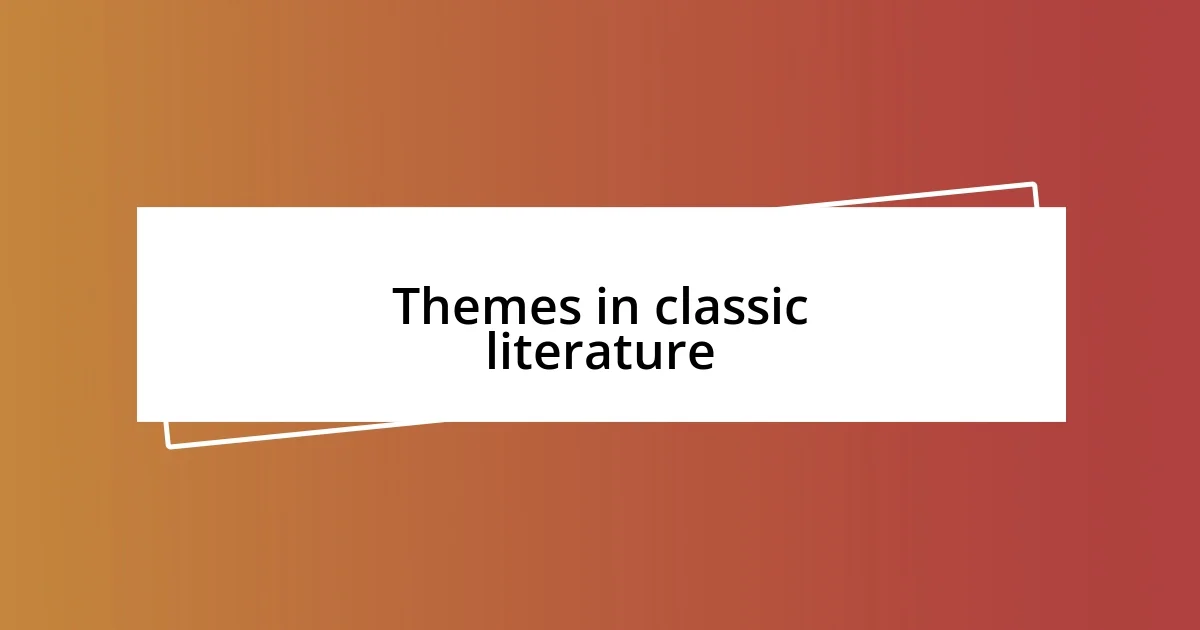
Themes in classic literature
Classic literature is rich with themes that resonate across time, often focusing on morality, societal norms, and the human condition. I vividly remember grappling with the themes of duty and honor in “Pride and Prejudice.” The societal expectations placed on characters felt almost claustrophobic at times, making me reflect on how external pressures can shape personal choices. Isn’t it intriguing how these timeless themes continue to echo in our lives today?
Another aspect that stands out to me in classic literature is its exploration of love’s complexities. I can’t help but think of “Wuthering Heights” and the tumultuous love story between Cathy and Heathcliff. Their passion was both destructive and poetic, making me question the nature of love itself. It’s fascinating how the raw emotions depicted in classic stories can still evoke deep feelings and thoughts about our own relationships.
Finally, classic works often grapple with existential questions, which I find profoundly engaging. Reading “The Stranger” by Albert Camus challenged my perception of existence and purpose. The protagonist’s indifference to life and society stirred something within me, compelling me to examine my own beliefs. How often do we take the time to confront the big questions? Classic literature seems to encourage us to do just that, inviting readers to ponder life’s deeper meanings.
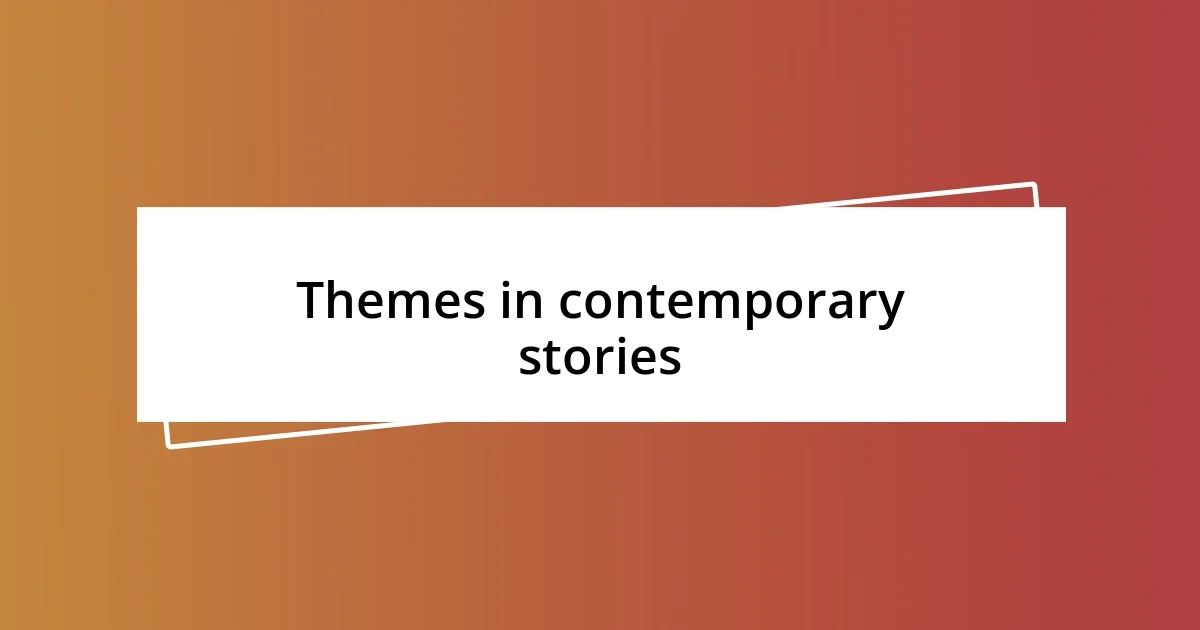
Themes in contemporary stories
Contemporary stories often resonate deeply with readers through their exploration of identity and the complexities of modern life. I found myself reflecting on my own experiences when I read “The Hate U Give.” The protagonist, Starr, navigates her multicultural background and the societal implications of her environment. It made me realize how our identities are shaped by the places we come from and the challenges we face. Isn’t it eye-opening how stories like these spark conversations about race, privilege, and activism that feel so urgent in today’s world?
Another prominent theme in contemporary fiction is the struggle with mental health, which is often depicted with raw honesty. After reading “Everything Here Is Beautiful,” I was left contemplating my relationships with friends and family as the characters grappled with the effects of mental illness. It was a stark reminder of how intertwined our lives can be, and how understanding each other’s struggles can foster empathy. Why do we often shy away from discussing mental health? Contemporary literature encourages us to break that silence and listen more openly.
Additionally, the theme of technology and its impact on human connections permeates many contemporary narratives, profoundly reflecting our current reality. I think of “Dark Matter” by Blake Crouch, which brilliantly explores the choices we make in life and how technology alters our paths. It got me thinking: Are we truly present in our own lives, or are we constantly caught up in the digital whirlwind? This theme prompts readers to examine their relationships with technology and question how it shapes their own stories and connections with others.
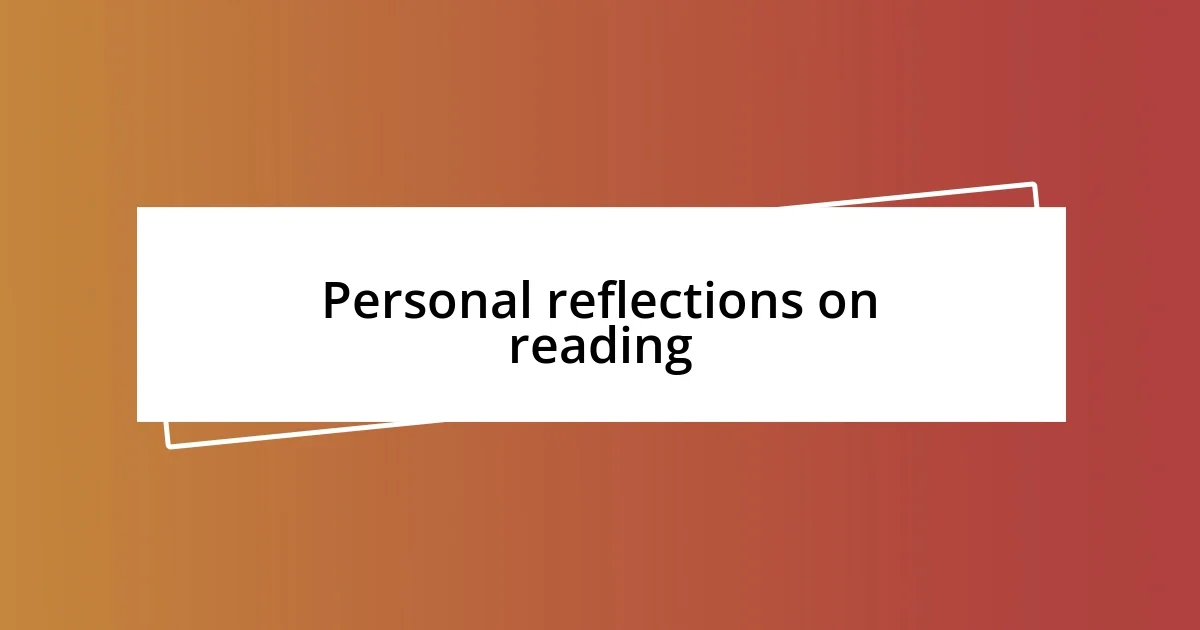
Personal reflections on reading
Reading has always been a journey for me, one that offers a glimpse into not just other worlds but also my own psyche. I remember the anticipation as I turned the first pages of “The Great Gatsby.” The opulence and the underlying emptiness of the characters’ lives hit me hard. It made me question: Are we sometimes chasing dreams that lead to disillusionment? That thought lingered for days after I closed the book.
One of the most profound experiences I’ve had with reading happened while delving into “The Bell Jar” by Sylvia Plath. The raw depiction of mental health struggles felt like a mirror reflecting my own insecurities. I found myself feeling both connected and exposed, as if Plath had plucked my thoughts right out of my mind. Why does literature have such a powerful way of making us confront our deepest fears? It’s that uncanny resonance that keeps drawing me back to the page.
With each book, I realize that I’m not just consuming stories but engaging in a dialogue with the characters. When I read “The Catcher in the Rye,” I felt Holden Caulfield’s cynicism wrapping around me like a familiar blanket. I pondered how many of us wear masks to navigate daily life. Isn’t it curious that through these fictional characters, we often uncover truths about ourselves that we might otherwise ignore? That’s the magic of reading—it’s not merely about the plot; it’s about discovering who we are along the way.
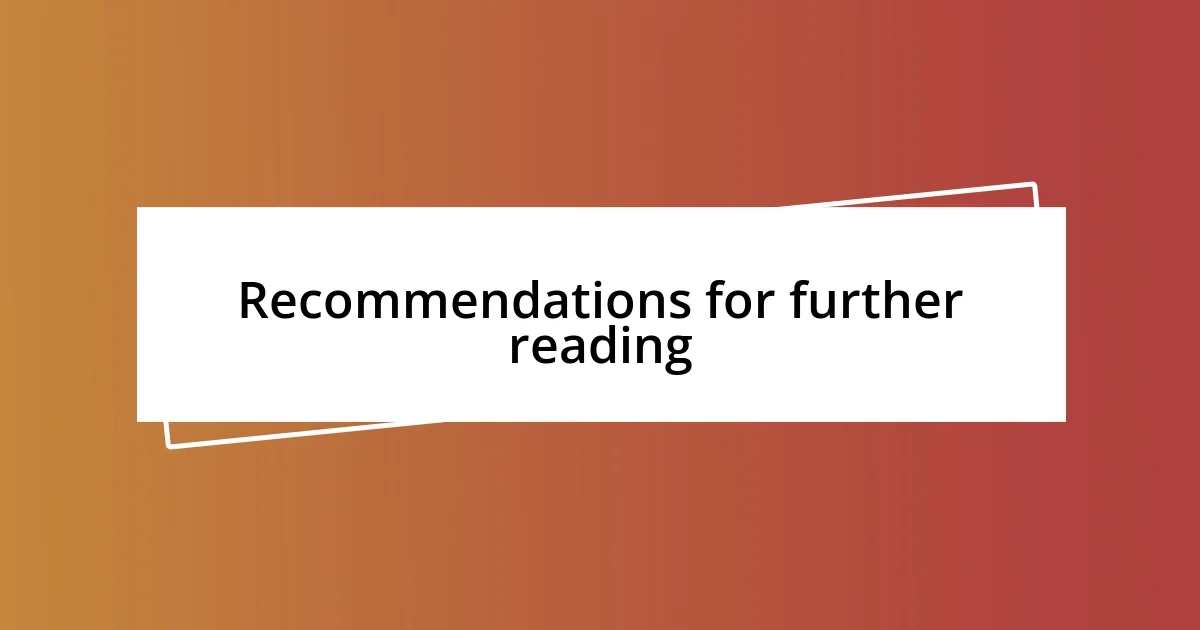
Recommendations for further reading
For those interested in delving deeper into the contrast between contemporary and classic fiction, I highly recommend “White Teeth” by Zadie Smith. This novel explores themes of identity and multiculturalism in a way that beautifully illuminates the blending of backgrounds and generations. I remember being struck by how Smith’s vibrant characters navigated their differences; it sparked a realization in me about the rich tapestry of cultures that shape our identities today.
If you’re leaning toward classic fiction, I’d suggest “Pride and Prejudice” by Jane Austen. The novel’s keen observations on societal norms and gender roles remain relevant, prompting me to reflect on the expectations we still encounter. While it may have been written in the early 1800s, its themes of individuality and social pressure felt surprisingly modern to me. How is it that such an old story can still make us question our values?
Lastly, exploring the dystopian realm could lead you to “The Handmaid’s Tale” by Margaret Atwood. In a world where women’s rights are stripped away, the narrative left me feeling both terrified and empowered. It’s fascinating how literature echoes real societal issues, making me wonder: are we, as a society, repeating the mistakes of the past? The urgency of Atwood’s prose encourages readers to engage in critical conversations about our own futures.


